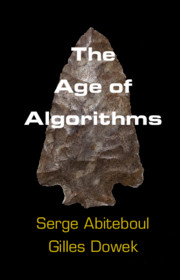Book contents
- The Age of Algorithms
- The Age of Algorithms
- Copyright page
- Contents
- Acknowledgments
- 1 Algorithms Intrigue, Algorithms Disturb
- 2 What Is an Algorithm?
- 3 Algorithms, Computers, and Programs
- 4 What Algorithms Do
- 5 What Algorithms Don’t Do
- 6 Computational Thinking
- 7 The End of Employment
- 8 The End of Work
- 9 The End of Property
- 10 Governing in the Age of Algorithms
- 11 An Algorithm in the Community
- 12 The Responsibility of Algorithms
- 13 Personal Data and Privacy
- 14 Fairness, Transparency, and Diversity
- 15 Computer Science and Ecology
- 16 Computer Science Education
- 17 The Augmented Human
- 18 Can an Algorithm Be Intelligent?
- 19 Can an Algorithm Have Feelings?
- 20 Time to Choose
6 - Computational Thinking
Published online by Cambridge University Press: 17 March 2020
- The Age of Algorithms
- The Age of Algorithms
- Copyright page
- Contents
- Acknowledgments
- 1 Algorithms Intrigue, Algorithms Disturb
- 2 What Is an Algorithm?
- 3 Algorithms, Computers, and Programs
- 4 What Algorithms Do
- 5 What Algorithms Don’t Do
- 6 Computational Thinking
- 7 The End of Employment
- 8 The End of Work
- 9 The End of Property
- 10 Governing in the Age of Algorithms
- 11 An Algorithm in the Community
- 12 The Responsibility of Algorithms
- 13 Personal Data and Privacy
- 14 Fairness, Transparency, and Diversity
- 15 Computer Science and Ecology
- 16 Computer Science Education
- 17 The Augmented Human
- 18 Can an Algorithm Be Intelligent?
- 19 Can an Algorithm Have Feelings?
- 20 Time to Choose
Summary
A scientific revolution does not only create new knowledge. It also generates new ways of thinking, new ways of asking questions, and new ways of answering them. Before the scientific revolution at the beginning of the seventeenth century, when questions were raised, for example, about whether or not blood circulated in the body, people looked for answers in the ancient texts. Aristotle and Galen taught that blood did not circulate in the body; therefore, the question had been answered. How did Aristotle and Galen know what they knew? That question was not posed. They were more knowledgeable than us, and that was sufficient.
Information
- Type
- Chapter
- Information
- The Age of Algorithms , pp. 45 - 52Publisher: Cambridge University PressPrint publication year: 2020
